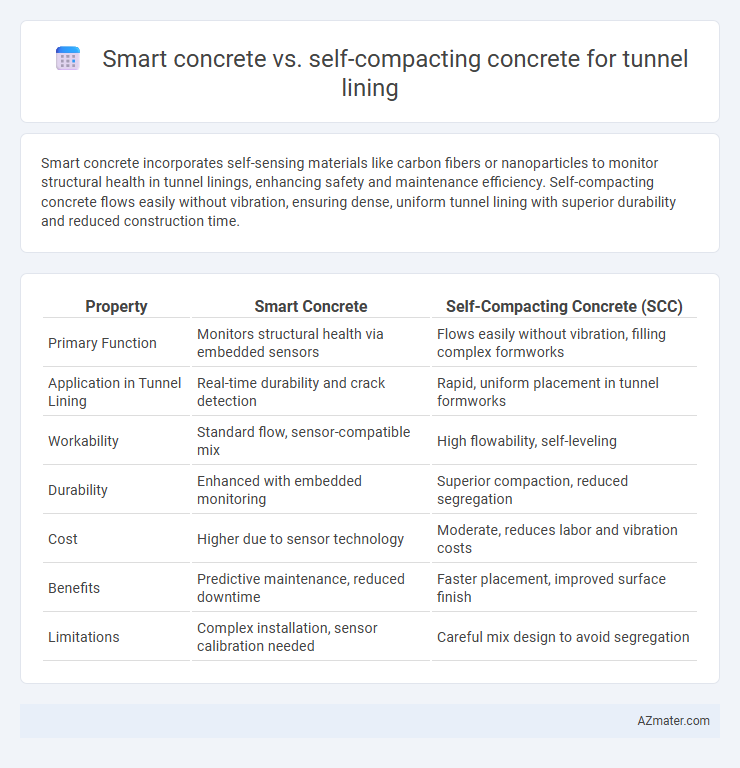Smart concrete incorporates self-sensing materials like carbon fibers or nanoparticles to monitor structural health in tunnel linings, enhancing safety and maintenance efficiency. Self-compacting concrete flows easily without vibration, ensuring dense, uniform tunnel lining with superior durability and reduced construction time.
Table of Comparison
| Property | Smart Concrete | Self-Compacting Concrete (SCC) |
|---|---|---|
| Primary Function | Monitors structural health via embedded sensors | Flows easily without vibration, filling complex formworks |
| Application in Tunnel Lining | Real-time durability and crack detection | Rapid, uniform placement in tunnel formworks |
| Workability | Standard flow, sensor-compatible mix | High flowability, self-leveling |
| Durability | Enhanced with embedded monitoring | Superior compaction, reduced segregation |
| Cost | Higher due to sensor technology | Moderate, reduces labor and vibration costs |
| Benefits | Predictive maintenance, reduced downtime | Faster placement, improved surface finish |
| Limitations | Complex installation, sensor calibration needed | Careful mix design to avoid segregation |
Introduction to Advanced Concrete Technologies
Smart concrete incorporates embedded sensors and self-sensing materials to monitor structural health in real-time, enhancing tunnel lining maintenance and safety. Self-compacting concrete (SCC) flows easily into complex tunnel molds without mechanical vibration, ensuring uniformity and reducing labor costs during construction. Advanced concrete technologies in tunnel lining combine these innovations to improve durability, resilience, and efficiency in demanding subterranean environments.
Overview of Tunnel Lining Requirements
Tunnel lining requires materials with high durability, load-bearing capacity, and resistance to environmental stressors such as water infiltration and chemical exposure. Smart concrete incorporates sensors and self-sensing capabilities to monitor structural health in real-time, enhancing safety and maintenance efficiency. Self-compacting concrete offers excellent flowability and uniformity, ensuring dense, void-free linings that meet strict dimensional and strength criteria under challenging tunnel construction conditions.
What is Smart Concrete?
Smart concrete incorporates advanced materials such as carbon fibers and nanosensors, enabling real-time structural health monitoring and self-healing properties in tunnel linings. This innovative material enhances durability and safety by detecting stress, cracks, and environmental changes, reducing maintenance needs compared to traditional methods. Self-compacting concrete, by contrast, excels in flowability and ease of placement but lacks the integrated sensing and adaptive capabilities of smart concrete.
What is Self-Compacting Concrete?
Self-Compacting Concrete (SCC) is a highly flowable, non-segregating concrete mixture designed to effortlessly fill formwork and encapsulate reinforcement without the need for mechanical vibration. SCC's superior workability ensures uniform density and surface finish in complex tunnel lining structures, reducing construction time and labor costs. Its optimized mix includes fine powders, high-range water reducers, and viscosity-modifying agents, making it ideal for tunnel segments with dense reinforcement or intricate geometries.
Material Properties Comparison
Smart concrete incorporates sensors and self-healing agents that enhance durability and crack resistance, optimizing long-term structural integrity in tunnel lining applications. Self-compacting concrete exhibits superior flowability and compaction without mechanical vibration, ensuring uniform density and reducing voids in complex tunnel forms. Material properties comparison highlights smart concrete's advanced monitoring capabilities and enhanced performance under stress, while self-compacting concrete excels in ease of placement and minimizing labor-intensive processes.
Performance in Tunnel Lining Applications
Smart concrete enhances tunnel lining performance by integrating sensors that monitor structural health, detecting strain, cracks, and temperature changes in real-time. Self-compacting concrete improves constructability with superior flowability and high resistance to segregation, ensuring uniform lining thickness and reducing construction time. Smart concrete's adaptive capabilities combined with self-compacting concrete's workability offer enhanced durability and safety in tunnel lining applications.
Durability and Longevity Considerations
Smart concrete for tunnel lining incorporates sensors and self-healing capabilities that enhance durability by detecting and repairing micro-cracks, significantly extending structural lifespan under harsh underground conditions. Self-compacting concrete provides superior workability and uniformity, reducing voids and segregation that contribute to early deterioration, thereby improving longevity in tunnel linings. Durability assessments favor smart concrete where real-time monitoring and adaptive responses to damage improve maintenance strategies, while self-compacting concrete ensures consistent quality essential for long-term structural integrity.
Cost and Implementation Efficiency
Smart concrete integrates sensors for real-time structural health monitoring, increasing initial costs but reducing long-term maintenance expenses in tunnel lining. Self-compacting concrete offers faster placement and improved surface finish without vibration, lowering labor costs and enhancing implementation efficiency. While smart concrete requires advanced installation and calibration, self-compacting concrete streamlines construction processes, providing cost-effective and timely solutions for tunnel lining projects.
Sustainability and Environmental Impact
Smart concrete for tunnel lining integrates embedded sensors that monitor structural health, enabling proactive maintenance and extending the lifespan, which reduces resource consumption and environmental impact. Self-compacting concrete (SCC) minimizes the need for vibration equipment and labor, lowering energy use and noise pollution during construction, while its high flowability ensures better compaction and durability, reducing material waste. Both technologies contribute to sustainability by enhancing durability and reducing carbon footprints, but smart concrete's real-time monitoring offers a more advanced approach to lifecycle optimization and environmental efficiency.
Future Trends in Tunnel Concrete Technologies
Smart concrete integrates embedded sensors for real-time structural health monitoring, enhancing tunnel safety and maintenance efficiency, while self-compacting concrete offers superior flowability and uniformity, reducing labor costs and improving tunnel lining durability. Future trends in tunnel concrete technologies emphasize multi-functional smart materials combining self-healing capabilities with advanced sensor networks to detect and autonomously repair micro-cracks. Innovations in nano-engineered additives and AI-driven data analytics are driving the development of intelligent tunnel linings that optimize performance and extend service life under extreme underground conditions.

Infographic: Smart concrete vs Self-compacting concrete for Tunnel lining
 azmater.com
azmater.com